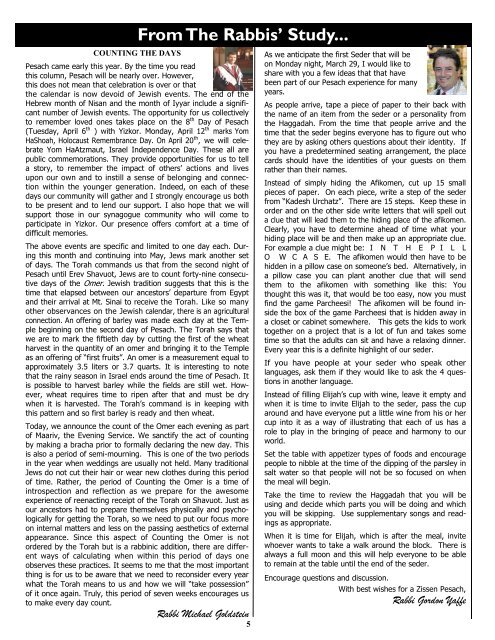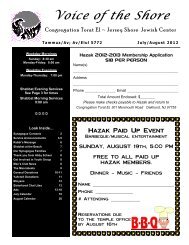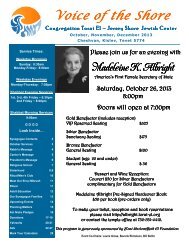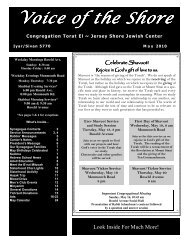Voice of the Shore
April 2010 Bulletin - Congregation Torat El
April 2010 Bulletin - Congregation Torat El
- No tags were found...
You also want an ePaper? Increase the reach of your titles
YUMPU automatically turns print PDFs into web optimized ePapers that Google loves.
COUNTING THE DAYS<br />
From The Rabbis’ Study...<br />
Pesach came early this year. By <strong>the</strong> time you read<br />
this column, Pesach will be nearly over. However,<br />
this does not mean that celebration is over or that<br />
<strong>the</strong> calendar is now devoid <strong>of</strong> Jewish events. The end <strong>of</strong> <strong>the</strong><br />
Hebrew month <strong>of</strong> Nisan and <strong>the</strong> month <strong>of</strong> Iyyar include a significant<br />
number <strong>of</strong> Jewish events. The opportunity for us collectively<br />
to remember loved ones takes place on <strong>the</strong> 8 th Day <strong>of</strong> Pesach<br />
(Tuesday, April 6 th ) with Yizkor. Monday, April 12 th marks Yom<br />
HaShoah, Holocaust Remembrance Day. On April 20 th , we will celebrate<br />
Yom HaAtzmaut, Israel Independence Day. These all are<br />
public commemorations. They provide opportunities for us to tell<br />
a story, to remember <strong>the</strong> impact <strong>of</strong> o<strong>the</strong>rs’ actions and lives<br />
upon our own and to instill a sense <strong>of</strong> belonging and connection<br />
within <strong>the</strong> younger generation. Indeed, on each <strong>of</strong> <strong>the</strong>se<br />
days our community will ga<strong>the</strong>r and I strongly encourage us both<br />
to be present and to lend our support. I also hope that we will<br />
support those in our synagogue community who will come to<br />
participate in Yizkor. Our presence <strong>of</strong>fers comfort at a time <strong>of</strong><br />
difficult memories.<br />
The above events are specific and limited to one day each. During<br />
this month and continuing into May, Jews mark ano<strong>the</strong>r set<br />
<strong>of</strong> days. The Torah commands us that from <strong>the</strong> second night <strong>of</strong><br />
Pesach until Erev Shavuot, Jews are to count forty-nine consecutive<br />
days <strong>of</strong> <strong>the</strong> Omer. Jewish tradition suggests that this is <strong>the</strong><br />
time that elapsed between our ancestors’ departure from Egypt<br />
and <strong>the</strong>ir arrival at Mt. Sinai to receive <strong>the</strong> Torah. Like so many<br />
o<strong>the</strong>r observances on <strong>the</strong> Jewish calendar, <strong>the</strong>re is an agricultural<br />
connection. An <strong>of</strong>fering <strong>of</strong> barley was made each day at <strong>the</strong> Temple<br />
beginning on <strong>the</strong> second day <strong>of</strong> Pesach. The Torah says that<br />
we are to mark <strong>the</strong> fiftieth day by cutting <strong>the</strong> first <strong>of</strong> <strong>the</strong> wheat<br />
harvest in <strong>the</strong> quantity <strong>of</strong> an omer and bringing it to <strong>the</strong> Temple<br />
as an <strong>of</strong>fering <strong>of</strong> “first fruits”. An omer is a measurement equal to<br />
approximately 3.5 liters or 3.7 quarts. It is interesting to note<br />
that <strong>the</strong> rainy season in Israel ends around <strong>the</strong> time <strong>of</strong> Pesach. It<br />
is possible to harvest barley while <strong>the</strong> fields are still wet. However,<br />
wheat requires time to ripen after that and must be dry<br />
when it is harvested. The Torah’s command is in keeping with<br />
this pattern and so first barley is ready and <strong>the</strong>n wheat.<br />
Today, we announce <strong>the</strong> count <strong>of</strong> <strong>the</strong> Omer each evening as part<br />
<strong>of</strong> Maariv, <strong>the</strong> Evening Service. We sanctify <strong>the</strong> act <strong>of</strong> counting<br />
by making a bracha prior to formally declaring <strong>the</strong> new day. This<br />
is also a period <strong>of</strong> semi-mourning. This is one <strong>of</strong> <strong>the</strong> two periods<br />
in <strong>the</strong> year when weddings are usually not held. Many traditional<br />
Jews do not cut <strong>the</strong>ir hair or wear new clo<strong>the</strong>s during this period<br />
<strong>of</strong> time. Ra<strong>the</strong>r, <strong>the</strong> period <strong>of</strong> Counting <strong>the</strong> Omer is a time <strong>of</strong><br />
introspection and reflection as we prepare for <strong>the</strong> awesome<br />
experience <strong>of</strong> reenacting receipt <strong>of</strong> <strong>the</strong> Torah on Shavuot. Just as<br />
our ancestors had to prepare <strong>the</strong>mselves physically and psychologically<br />
for getting <strong>the</strong> Torah, so we need to put our focus more<br />
on internal matters and less on <strong>the</strong> passing aes<strong>the</strong>tics <strong>of</strong> external<br />
appearance. Since this aspect <strong>of</strong> Counting <strong>the</strong> Omer is not<br />
ordered by <strong>the</strong> Torah but is a rabbinic addition, <strong>the</strong>re are different<br />
ways <strong>of</strong> calculating when within this period <strong>of</strong> days one<br />
observes <strong>the</strong>se practices. It seems to me that <strong>the</strong> most important<br />
thing is for us to be aware that we need to reconsider every year<br />
what <strong>the</strong> Torah means to us and how we will “take possession”<br />
<strong>of</strong> it once again. Truly, this period <strong>of</strong> seven weeks encourages us<br />
to make every day count.<br />
Rabbi Michael Goldstein<br />
5<br />
As we anticipate <strong>the</strong> first Seder that will be<br />
on Monday night, March 29, I would like to<br />
share with you a few ideas that that have<br />
been part <strong>of</strong> our Pesach experience for many<br />
years.<br />
As people arrive, tape a piece <strong>of</strong> paper to <strong>the</strong>ir back with<br />
<strong>the</strong> name <strong>of</strong> an item from <strong>the</strong> seder or a personality from<br />
<strong>the</strong> Haggadah. From <strong>the</strong> time that people arrive and <strong>the</strong><br />
time that <strong>the</strong> seder begins everyone has to figure out who<br />
<strong>the</strong>y are by asking o<strong>the</strong>rs questions about <strong>the</strong>ir identity. If<br />
you have a predetermined seating arrangement, <strong>the</strong> place<br />
cards should have <strong>the</strong> identities <strong>of</strong> your guests on <strong>the</strong>m<br />
ra<strong>the</strong>r than <strong>the</strong>ir names.<br />
Instead <strong>of</strong> simply hiding <strong>the</strong> Afikomen, cut up 15 small<br />
pieces <strong>of</strong> paper. On each piece, write a step <strong>of</strong> <strong>the</strong> seder<br />
from “Kadesh Urchatz”. There are 15 steps. Keep <strong>the</strong>se in<br />
order and on <strong>the</strong> o<strong>the</strong>r side write letters that will spell out<br />
a clue that will lead <strong>the</strong>m to <strong>the</strong> hiding place <strong>of</strong> <strong>the</strong> afikomen.<br />
Clearly, you have to determine ahead <strong>of</strong> time what your<br />
hiding place will be and <strong>the</strong>n make up an appropriate clue.<br />
For example a clue might be: I N T H E P I L L<br />
O W C A S E. The afikomen would <strong>the</strong>n have to be<br />
hidden in a pillow case on someone’s bed. Alternatively, in<br />
a pillow case you can plant ano<strong>the</strong>r clue that will send<br />
<strong>the</strong>m to <strong>the</strong> afikomen with something like this: You<br />
thought this was it, that would be too easy, now you must<br />
find <strong>the</strong> game Parcheesi! The afikomen will be found inside<br />
<strong>the</strong> box <strong>of</strong> <strong>the</strong> game Parcheesi that is hidden away in<br />
a closet or cabinet somewhere. This gets <strong>the</strong> kids to work<br />
toge<strong>the</strong>r on a project that is a lot <strong>of</strong> fun and takes some<br />
time so that <strong>the</strong> adults can sit and have a relaxing dinner.<br />
Every year this is a definite highlight <strong>of</strong> our seder.<br />
If you have people at your seder who speak o<strong>the</strong>r<br />
languages, ask <strong>the</strong>m if <strong>the</strong>y would like to ask <strong>the</strong> 4 questions<br />
in ano<strong>the</strong>r language.<br />
Instead <strong>of</strong> filling Elijah’s cup with wine, leave it empty and<br />
when it is time to invite Elijah to <strong>the</strong> seder, pass <strong>the</strong> cup<br />
around and have everyone put a little wine from his or her<br />
cup into it as a way <strong>of</strong> illustrating that each <strong>of</strong> us has a<br />
role to play in <strong>the</strong> bringing <strong>of</strong> peace and harmony to our<br />
world.<br />
Set <strong>the</strong> table with appetizer types <strong>of</strong> foods and encourage<br />
people to nibble at <strong>the</strong> time <strong>of</strong> <strong>the</strong> dipping <strong>of</strong> <strong>the</strong> parsley in<br />
salt water so that people will not be so focused on when<br />
<strong>the</strong> meal will begin.<br />
Take <strong>the</strong> time to review <strong>the</strong> Haggadah that you will be<br />
using and decide which parts you will be doing and which<br />
you will be skipping. Use supplementary songs and readings<br />
as appropriate.<br />
When it is time for Elijah, which is after <strong>the</strong> meal, invite<br />
whoever wants to take a walk around <strong>the</strong> block. There is<br />
always a full moon and this will help everyone to be able<br />
to remain at <strong>the</strong> table until <strong>the</strong> end <strong>of</strong> <strong>the</strong> seder.<br />
Encourage questions and discussion.<br />
With best wishes for a Zissen Pesach,<br />
Rabbi Gordon Yaffe















